
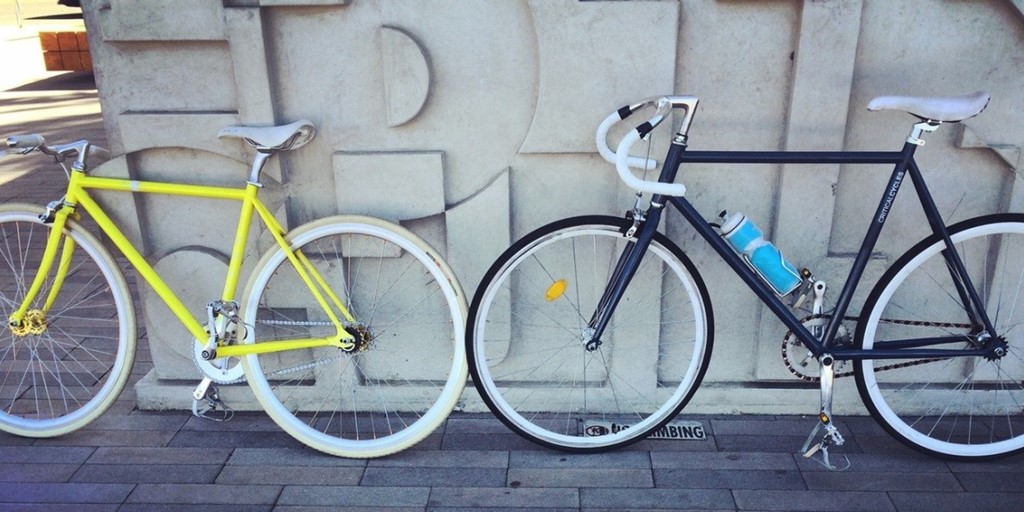
Between April 2014 and March 2015, there were 381,000 reported incidents of bike theft in England and Wales. When you take into account that a large proportion of people (up to 75%) don’t even report their stolen bicycles to the authorities then the potential figure is even more staggering.
That sinking feeling you get when you realise that your bike is no longer where you left it is sadly all too common, but there are things that you can and should do as quickly as possible to maximise your chances of recovering it. Here's what to do when your bike is stolen:
1. Don’t panic!
It might sound like a cliché, but ensuring that you think and act rationally after discovering you’re the victim of this type of crime isn’t always as easy as you might think. Depending on where you are when your bicycle is stolen, you could be left stranded somewhere miles away from home to compound the rollercoaster of emotions that you’re likely to experience.
Many cyclists who have their bike stolen first enter a stage of shock or disbelief. “Did I leave my bike somewhere else today?” or if it’s been taken from a communal area of your home “maybe my neighbour just moved it?”
After it’s become clear that your bicycle really has gone missing, often the next emotion people experience is understandably anger and/or outrage. Some people also feel embarrassed that they have been a victim of this type of crime, especially if they feel they didn’t adequately secure their bike and they blame themselves.
However, it’s important to make sure that you are able to set emotions aside in order to put the next steps in motion as quickly as you can to stand the best possible chance of getting your property back.
2. Inform the police
There are usually a couple of different ways in which you can report your stolen bike to the police. Many local police forces no longer allow you to log a crime online, but instead direct you to call them for non-urgent crime reports on 101.
However, it is recommended whenever possible that you report your bike theft in person at your local police station. This way you are usually able to provide any photos you have of your bike, plus the frame number, a description of the bike type and when and where it went missing. You can find your closest station by visiting www.police.uk.
If you are in London, you can also report your stolen bike to the Cycle Task Force by contacting them at cycletaskforce@met.police.uk.
Make sure that you receive a crime reference number from the member of the force that you speak to.
3. Inform your insurer
You’ll need to inform your cycle insurance provider as soon as possible after you’ve discovered the crime and reported it to the police. Preferably within 24 hours.
If you don’t have specific bicycle insurance and your bike was taken from your home, if you’re lucky it may be covered by your home contents insurance policy depending on the cover you have. But when it comes to a claim on your household contents policy, you may find that they have a small value limit for individual items and your premium will increase steeply following a claim.If you do have bike insurance, you will find that having the following to hand will help your claim progress as quickly as possible:
- Your policy number
- The date of the theft
- The crime reference number from the police when you reported the bike stolen
- Evidence of your ownership of the bike e.g. sales receipt, a bank statement that included the purchase, or any other evidence which shows the details of the date you bought the bike, the price paid, a description of the bike and any accessories that were also stolen.
- Photographs of the bike
- Any damaged items or locks left behind
John Woosey, Managing Director at Cycleplan, adds:
“Here at Cycleplan, we understand the risks and costs faced by cyclists on a daily basis. Theft, loss, damage and accidents unfortunately can and do happen. According to crime data, around 376,000 bicycles are reported stolen every year in the UK; this works out at about one bicycle stolen every 90 seconds. This is why it’s essential to be riding with specialist cycle insurance to cover yourself and your equipment. Our specialist cycle insurance will bring complete peace of mind, so you can focus on the joy of the ride.”
4. Get the word out
Whilst the recovery rate of stolen bikes may be low, there are lots of steps you can take to help make your bicycle too hot to handle. Or in some cases, you might even catch the thief in the act of trying to sell it on.
Post about the crime on your own social media networks. Include photos of your bike, a summary of the time and circumstances in which it was taken. One of the good things about this method is that you don’t need to put your phone number or exact address on any posts – people can contact you by messaging, tweeting or tagging you.
The best ways to do a post about the theft can vary on different platforms, but here are our top tips:
- For a Facebook post, make sure that you set this to ‘public’ so that anyone can see and share your post.
- If you have a ‘protected’ Twitter account, it might be worth making this public for a short time by unprotecting your tweets in order for your tweets to be seen by a larger potential audience. Use a couple of hashtags if it’s possible to squeeze them into your tweet e.g. #stolenlondon #stolenbike. Some people find that creating an image with the info about the stolen bike to tweet is the best way to do it as this frees up characters for hashtags. You can quickly do this using an online tool such as https://www.canva.com/. See example below:
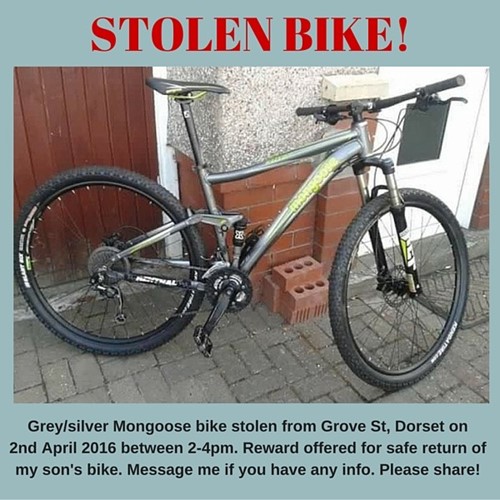
- The same advice for making your posts public applies to Instagram Another tip is to use relevant hashtags in your Instagram posts to raise visibility for those who use them to discover new content. Hashtag your location and brand/bike type e.g. #stolen #stolenbike #bikestolen #shoreditch #london #cannondale #roadbike. You can use up to 30 hashtags per post so don’t be shy about it!
- Use Facebook local groups or communities to help raise the profile of the theft in the local community. Most places, even smaller towns and villages have Facebook groups such as ‘Lost & found in….’ and many have community groups where members can post alerts for stolen property. See an example below:
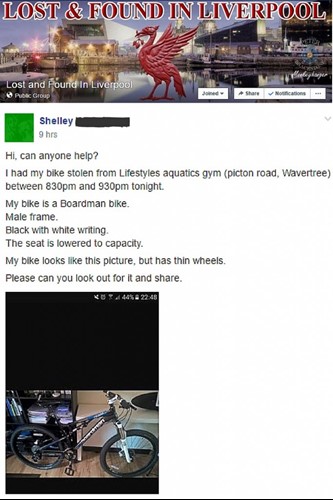
Sign up and post details of your bike on sites such as the below. They are not all exclusively UK-based but all have reach and influence in the UK:
http://www.findthatbike.co.uk/
What if you don’t have bicycle insurance?
As previously mentioned, if your bicycle was stolen from inside your home then your household contents insurance may cover it, but that will be down to your individual policy details and you will need to check with your insurer to find out if you’re covered.
Many cyclists choose to take out specialist cycle insurance as it can cover your bicycle wherever it goes, subject to using an approved lock.
For those without insurance, unless the bike can be recovered by the police (and in a condition still safe to ride) for the most part, cyclists are left high and dry until they can afford a replacement. Those at the more entry-level end of the scale may be able to chalk this off as a very annoying, expensive and inconvenient experience, but at the other extreme, some cycling equipment can be worth up to tens of thousands of pounds.
With no specialist insurance, a bike which is stolen from a public place, a communal area or a vehicle simply will not be covered and there will be no chance of recouping the cost of the cycling equipment.
We asked three people who had unfortunately experienced their uninsured bike being stolen to tell us their stories:
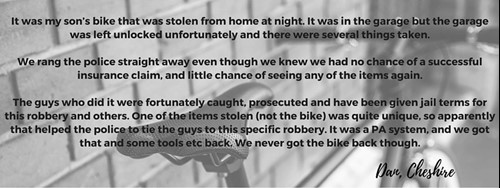
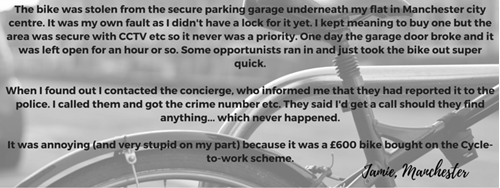
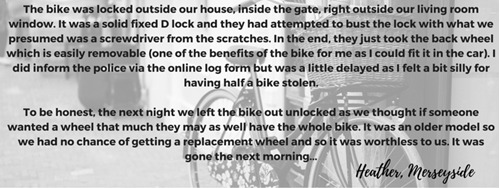
Always report the theft
It’s a common misconception that reporting these types of bicycle thefts to the police is a waste of time if your bike isn’t insured. It’s true that pulling out all the stops to find this stolen property is probably not going to be top of your local force’s agenda. However, when bikes are recovered, without a matching stolen bike report there is no chance of it being returned to its rightful owner. At least if you file a report and ensure that the relevant authorities are aware of the bike theft, there is a chance that your property might be returned.
PC Honey wants to encourage all victims of cycle crime to report the offence, for the benefit of all cyclists in the future:
“In the past cycle crime has not been taken very seriously but that has changed in recent years. Police are seeing more organisation around the theft and sale of bikes and people are making big money from it.”
“Police Yards are generally filled with recovered bikes but sadly most people do not know their frame numbers or any identifiers and so these cycles are never paired up with a victim. Reporting thefts even if you believe you will never see your bike again is very important as unless crimes are reported it will never reflect in the crime figures and hence not be seen as big a problem as it actually is. Crimes can only be dealt with and measured if they are actually being reported in the first place.”
If more stolen bicycles are reported to the authorities, there will be a clearer picture of the real scale of the problem and the greater the chance that these types of crime will move up the priority list.
Sources:
